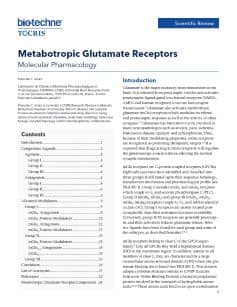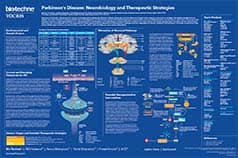Glutamate (Metabotropic) Group III Receptors
Metabotropic Glutamate (mGlu) group III receptors are members of the metabotropic class of glutamate receptors, which also includes mGlu group I and mGlu group II receptors. Group III receptors are divided into four subtypes, mGlu4, mGlu6, mGlu7 and mGlu8.
Glutamate (Metabotropic) Group III Receptor Agonists |
|
|---|---|
| Cat. No. | Product Name / Activity |
| 2385 | AMN 082 dihydrochloride |
| Selective mGlu7 agonist | |
| 0103 | L-AP4 |
| Selective group III mGlu agonist | |
| 1302 | (S)-3,4-DCPG |
| Potent and selective mGlu8a agonist | |
Glutamate (Metabotropic) Group III Receptor Antagonists |
|
| Cat. No. | Product Name / Activity |
| 0972 | CPPG |
| Potent group III mGlu antagonist | |
| 1209 | LY 341495 |
| Group II/III antagonist | |
| 0803 | MSOP |
| Specific group III mGlu antagonist | |
| 5248 | XAP 044 |
| Potent and selective mGlu7 antagonist | |
Glutamate (Metabotropic) Group III Receptor Modulators |
|
| Cat. No. | Product Name / Activity |
| 5715 | (±)-ADX 71743 |
| Negative allosteric modulator of mGlu7 receptors; brain penetrant | |
| 1212 | MPEP hydrochloride |
| Positive allosteric modulator of mGlu4 receptors; also potent mGlu5 antagonist | |
| 5378 | VU 0422288 |
| Selective positive allosteric modulator of group III mGlu receptors | |
| 6893 | VU 6005649 |
| Positive allosteric modulator of mGlu7 and mGlu8 receptors; also NK1 antagonist; brain penetrant | |
Metabotropic Glutamate (mGlu) group III receptors are members of the metabotropic class of glutamate receptors, which also includes mGlu group I and mGlu group II receptors. Group III receptors are divided into four subtypes, mGlu4, mGlu6, mGlu7 and mGlu8. mGlu group III receptors are coupled to Gi/o, which inhibits adenylyl cyclase, decreasing the formation of cAMP. These receptors are involved in spatial learning and memory, and umami taste (mGlu4), stimulation of photoreceptors (mGlu6), long term depression (mGlu7) and presynaptic inhibition in the perforant pathway (mGlu8). The human genes for mGlu4, mGlu6, mGlu7 and mGlu8 receptors have been localized to chromosomes 6 (6p21.3), 5 (5q35), 3 (3p26-p25) and 7 (7q31.3-q32.1) respectively.
External sources of pharmacological information for Glutamate (Metabotropic) Group III Receptors :
Literature for Glutamate (Metabotropic) Group III Receptors
Tocris offers the following scientific literature for Glutamate (Metabotropic) Group III Receptors to showcase our products. We invite you to request* your copy today!
*Please note that Tocris will only send literature to established scientific business / institute addresses.
Addiction Poster
The key feature of drug addiction is the inability to stop using a drug despite clear evidence of harm. This poster describes the brain circuits associated with addiction, and provides an overview of the main classes of addictive drugs and the neurotransmitter systems that they target.
Parkinson's Disease Poster
Parkinson's disease (PD) causes chronic disability and is the second most common neurodegenerative condition. This poster outlines the neurobiology of the disease, as well as highlighting current therapeutic treatments for symptomatic PD, and emerging therapeutic strategies to delay PD onset and progression.
Glutamate (Metabotropic) Group III Receptor Gene Data
| Gene | Species | Gene Symbol | Gene Accession No. | Protein Accession No. |
|---|---|---|---|---|
| mGlu4 | Human | GRM4 | NM_000841 | Q14833 |
| Mouse | Grm4 | NM_001013385 | Q68EF4 | |
| Rat | Grm4 | NM_022666 | P31423 | |
| mGlu6 | Human | GRM6 | NM_000843 | O15303 |
| Mouse | Grm6 | BC034118 | Q5NCH9 | |
| Rat | Grm6 | NM_022920 | P35349 | |
| mGlu7 | Human | GRM7 | NM_000844 | Q14831 |
| Mouse | Grm7 | NM_177328 | Q68ED2 | |
| Rat | Grm7 | NM_031040 | P35400 | |
| mGlu8 | Human | GRM8 | NM_000845 | O00222 |
| Mouse | Grm8 | NM_008174 | P47743 | |
| Rat | Grm8 | NM_022202 | P70579 |


